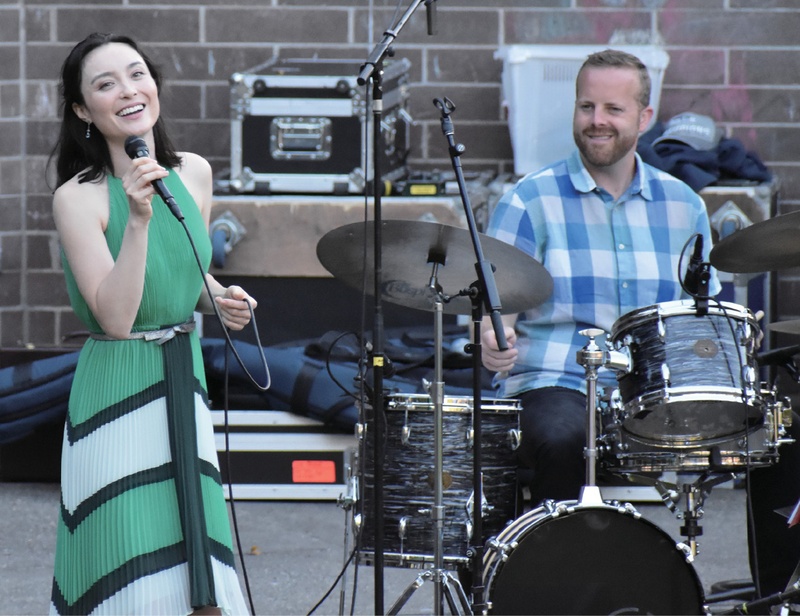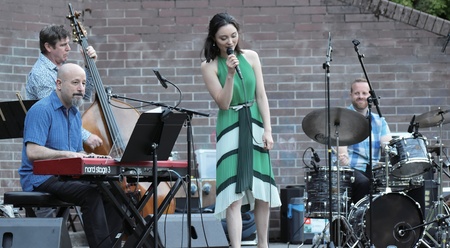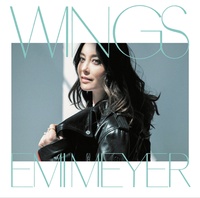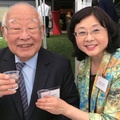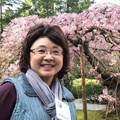Live Concert in Volunteer Park
She arrived in Seattle just before her performance this time. “I was struggling with how to bring the band members together,” she says. “I hadn’t brought any budget from Japan. How were we going to blend in a live Seattle performance?” Emi decided it was best to work with Seattle area jazz musicians. She decided to ask her piano teacher and sometime consultant Bill Anschell to choose her bandmates. Coincidentally, all the members were born and raised in Seattle. “It was just right for this event” Emi says. “Bill is very detailed. He held rehearsals with the band members before I arrived and went through the songs. He sent a recording to Japan so I could listen to it and make any adjustments I needed to. Some musicians are good at that sort of thing, and others aren’t. He is really good at it.”
Once the members had been selected, Emi put emphasis on the live experience and their personal compatibility on stage. She liked the idea of bringing together local musicians more than bringing a band from Japan. “When there is a language gap, it’s difficult to communicate from the stage at times,” she says. “For example, when performing in Korea, if a musician can speak Korean, he or she can interpret my comments, and that brings the audience closer.” Basically, musicians communicate in English, but Emi seems to communicate more with her music than her words. “If we are musically compatible, we will be compatible in other ways,” she says.
The live performance began just after the group members met each other. There was a point where the tempo was off, and they had to restart. “As we were exploring, we banged into a few production elements, but that’s simply what happens in live sessions. There was a moment of panic, though. (laughs) But Seattle audiences are very nice. The members were quite happy standing in front of that big audience. When I listened to the recording afterwards, I could feel the energy and excitement of the performers.”
Her performances in 2011 and 2012 were at the Sorrento Hotel on First Hill. It’s an old-fashioned hotel, and people listened to the free live performance while sipping cocktails by the fireplace. “It’s too bad they stopped the jazz shows during the hotel renovation,” she says. “There was a long time in between my performances, and I wasn’t sure who would show up.” But a surprise awaited. The space was filled with older men and women. People she knew in her youth in Seattle showed up with their families. “Everyone I was familiar with had become parents. It felt strange,” she says. “The local staff said this was the most diverse crowd they’d seen at a Volunteer Park performance. It made me very happy.”
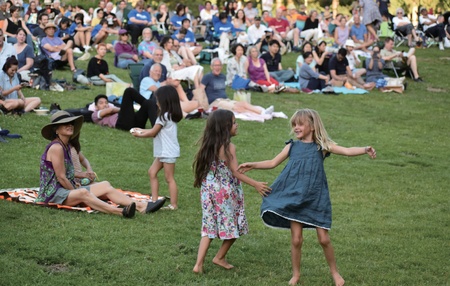
Ten Years of Performing
After 10 years of performing, Emi says she knows now “there are no shortcuts.” Nowadays, one can have moments when buzz on the Internet helps a lot, but back when she started, real money meant signing with a major label. “For me, I didn’t have the support of a major label and I don’t make music that is easy to sell. Also, I’m singing English songs in Japan. But I know some kids who had major debuts 10 years ago and are standing in the same place as me now looking for direction. If I could send a message to my earlier struggling self, I’d like to say, you can get to this place in 10 years.”
In Japan, there weren’t many musicians that did like Emi did, hiring musicians and producing her own album. That DIY mentality seems like a Seattle thing. Emi laughs at the idea. “If you get support from a label, they’ll be telling you to do this and that, and you’ll have to make some changes. My first step out into the world is the sound of my piano. I had that obsessive feeling. I wanted to protect my music. Next, if I wanted to sing in Japanese, for example, and challenge myself freely, I can discover my identity as an artist.”
The Real Emi Meyer
Emi, born in Japan and raised in the US, doesn’t see herself as Asian American. She came to the US with her mom, so she feels more like an immigrant. But the American media often categorizes her as an Asian American jazz singer. She says she sometimes thinks, “What am I?” In college, even when she joined a club for Asian Americans and mixed-race people, everyone had different experiences, and nothing really stuck for her. “I felt that wasn’t really the place for me. My music style is also hard to classify. It’s not jazz or pop, and not ethnic …I’ve given up trying to fit into the normal categories,” she laughs. She spends time with people she likes, hangs out with friends, uses her own money to release her own music. If people like it, great. This is how Emi thinks. She’s less interested in how her words or music forge her identity and more interested in which friends understand her and what sort of fan listens to her music. Now, she isn’t looking inward; she’s connecting with the outer world.
“On my first album, I was searching for my identity going deeper and deeper inside. Even if I try to show what sort of person I am, people will see whatever they want to see. I realized that my struggle finding my identity was meaningless. My music rings out to the fans and friends who listen to it, so even if they don’t clearly see who I am, I feel like it’s working. Eventually, I’ll go beyond that and come to a day where I realize, I’m this sort of person after all.”
A Mother and an Artist
Emi had her daughter in 2017 and became a mother. When Emi was on her own, she thought about what she wanted to do, what other people said about her, etc. But when her daughter was born, that all receded into the background. “My awareness had gone from myself to my child,” she says. “It became easier.”
She feels lucky that she can raise her daughter while also producing albums and going on tour. Doing both is difficult, but she thinks being a mom helps her career at the same time. “When I am practicing piano or getting ready for a live performance, my daughter will come calling. In those moments, I don’t want to say that work is more important than her. At home when we are together, my daughter is No.1. I don’t want her to think she is in a fight with the piano in front of her mom. Since I have limited time to work on my music, I am more focused and use my time wisely.”
Before, she would worry about forgetting the words to a song when getting up on stage, but now, she doesn’t worry so much. That’s one aspect of becoming a mother. “I’ve changed diapers right before going on stage,” she laughs. “There’s no time to get nervous! It feels like I have my feet on the ground. I also feel great respect for all women. My mom included, women have been struggling for generations, giving birth to children, raising them. People find time come to my concert during their busy lives. I feel much gratitude. I’ve become sensitive to the importance of people’s time.”
The album she released in June, Wings, was recorded in Nashville while she was still pregnant. The songs “Original” and “Nashville Lullaby” were for her yet unseen daughter, hoping that she will raise her to be her true self. “How can I support the original spirit she is born with, that pure part. ‘Nashville Lullaby’ is a commemoration to the perfect song for a baby still in the womb and just beginning to hear.”
Emi has been releasing albums annually since 2009. “This may be my last physical album,” she says. It is mostly an MP3 world, but the pride of a manager who loves analog record led to the October release of Wings as a single cut. The record has the warmth and vividness of uncompressed sound and emits a three-dimensional feeling. As a musician, it is wonderful to hear the song this way. “I’ll continue to steadily create songs and think about what sort of album I should put out.” She says. “Next year or the year after that, I want to return to Seattle to perform!”
* * * * *
Emi Meyer is a singer-songwriter active in Japan and the US. She is the child of a Japanese mom and American dad. Emi won the Seattle-Kobe Jazz Vocalist Competition in 2007. For her debut album, Curious Creature, she was selected for the year’s best new artist in the jazz section of the iTunes Store. Her songs have been used in many commercials, including ones for Coca Cola’s Sokenbicha tea and Toyota’s Prius. Her collaboration with Amazon, “Everything this Christmas,” is also streaming online. Last year, she released Wings, her first album in four years. Info: https://emimeyer.jp
Album Wings: Released in Japan on June 12, Emi’s album was recorded in the Music City of Nashville, Tennessee. She recorded at the Blackbird Studio, which has been used by Taylor Swift, John Mayer, Beck, and many other well-known stars. The album includes a lot of positive songs full of kindness and hope. You can find it on Spotify and other streaming services. The album is scheduled to be released in the US later this year.
*This article was originally published by Soy Source on December 12, 2019 and additionally published by The North American Post on January 23, 2020.
© 2020 Hitomi Kato / Soy Source / The North American Post


